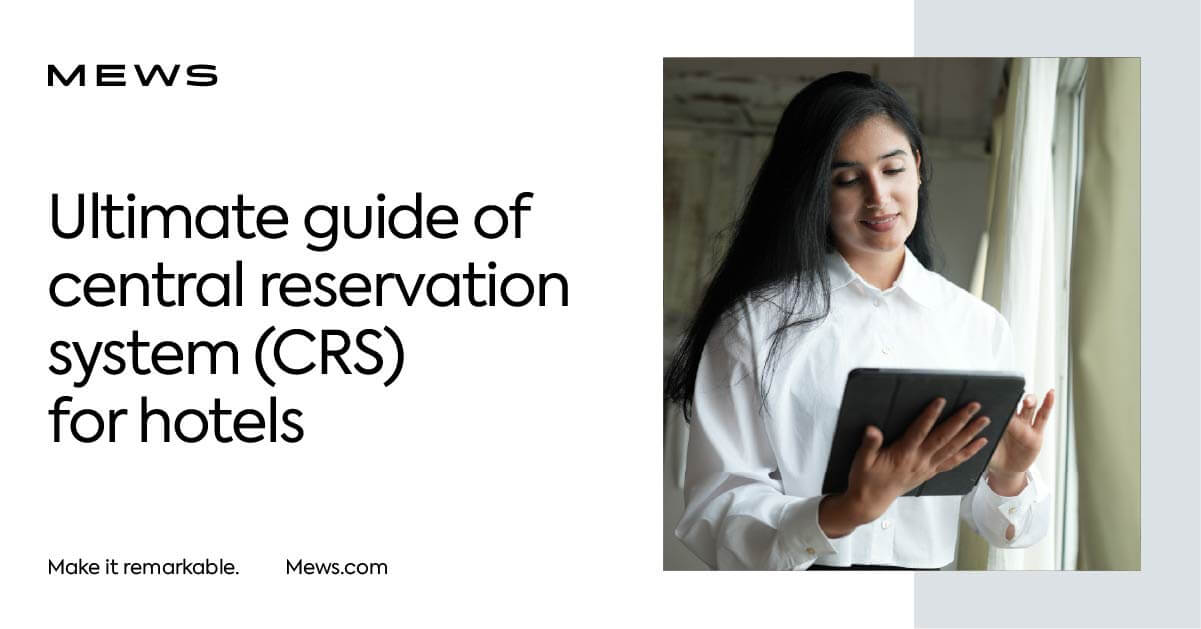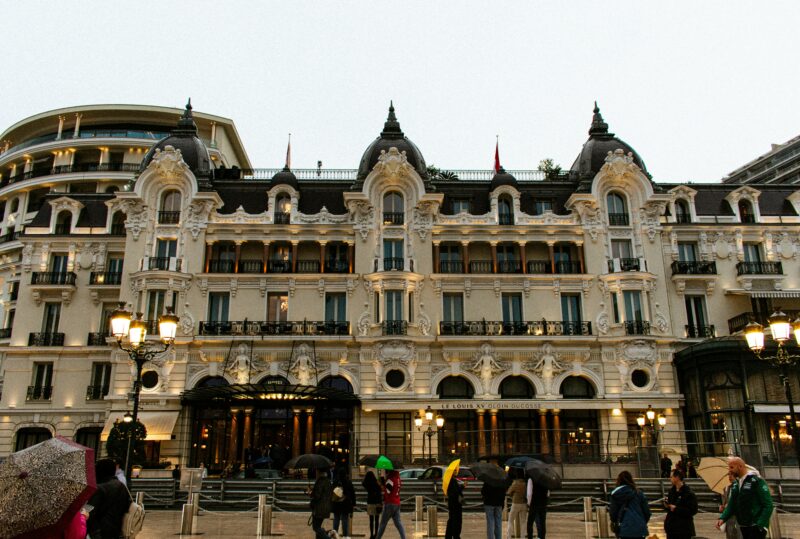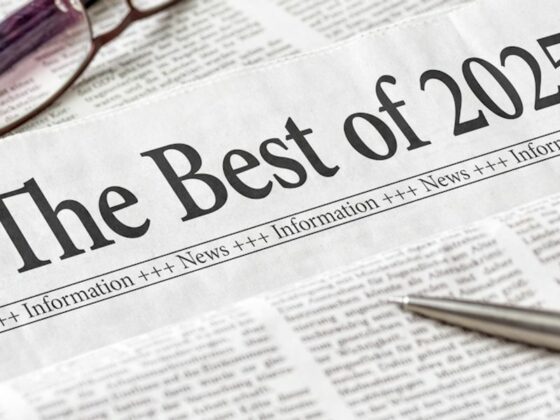What is a central reservation system (CRS)?
A central reservation system is reservation management software that helps hotels manage their inventory and rates in real time, streamlining the reservation process and making operations more efficient.
With user-friendly software like the RMS from Mews, you can easily handle direct bookings through your booking engine, manage group reservations, and oversee everything from room assignments to billing. These systems are vital for hoteliers aiming to boost operational efficiency because they automate many of the manual tasks that can slow down the booking process.
Why is having a CRS so important? Because reservations today are coming from multiple sources – not just direct channels. You need a system that can seamlessly manage bookings from OTAs, traditional travel agents, wholesalers, global distribution systems, and direct website bookings.
A CRS integrates with various distribution channels and syncs with your hotel management software, allowing you to diversify your distribution strategy without the hassle of managing logistics manually. It gives you the freedom to focus on attracting more guests, knowing the software is handling the behind-the-scenes work.

Why is a central reservation system important for hotels?
A central reservation system is essential for hotels because it optimizes revenue, boosts operational efficiency, and elevates the guest experience. Together, these advantages contribute to streamlined operations and long-term profitability.
One of the biggest perks of a CRS is its ability to simplify the booking process. By centralizing reservations, it helps minimize the risk of overbookings and double bookings. This centralized approach also improves inventory management, enabling hotels to update availability across multiple distribution channels in real time. For guests, this means they get the best rates when booking and can easily make special requests to personalize their stay.
A central reservation system can integrate seamlessly with your PMS, creating a unified platform that streamlines operational tasks. By leveraging both tools together, you can manage everything from reservations and room assignments to guest communications more efficiently, enhancing overall performance and guest satisfaction.
Differences between PMS and CRS
The key difference between a PMS and a CRS lies in their primary functions: a PMS focuses on internal operations and enhancing the guest experience, while a CRS is externally oriented, managing room availability and inventory across various distribution channels.
Though they serve different purposes, they work well together. A PMS handles daily tasks like guest check-ins, housekeeping, room assignments, and data management. On the other hand, a CRS manages room bookings and availability across external channels, syncing this information in real time across all platforms, including booking engines, to ensure seamless distribution.
What are the different types of CRS for hotels?
There are various types of central reservation systems available for hotels, each catering to different needs and strategies. These include:
- Standalone CRS: Operates independently without integration with other systems, suitable for properties with simpler needs.
- Integrated CRS: Works seamlessly with a hotel’s PMS, RMS, or CRM, offering a unified platform for streamlined operations.
- Cloud-Based CRS: Accessible from anywhere with an internet connection, offering flexibility and real-time updates.
- Chain or Brand CRS: Designed for multi-property hotel chains, centralizing reservations across all locations.
- GDS-Connected CRS: Links with a Global Distribution System (GDS), making it easy for travel agencies to access room availability.
- Enterprise CRS: Tailored for large hotel groups, handling high volumes of bookings and complex inventory needs.
- Mobile-Optimized CRS: Ensures the booking process is smooth on mobile devices, catering to the growing number of guests booking on the go.
- Third-Party Distribution CRS: Connects with multiple third-party channels like OTAs to maximize visibility.
- Direct Booking CRS: Focuses on driving bookings through the hotel’s own website, reducing reliance on OTAs.
The choice of CRS depends on your property’s size and distribution strategy, ensuring you select a system that best meets your operational needs and goals.

What are the main functionalities of a central reservation system?
A CRS offers a wide range of functionalities to streamline hotel operations, including managing reservations, group bookings, cancellations, refunds, inventory, rates, distribution, and analytics. Let’s dive into some of its key features:
Rate management
With the rate management capabilities of a CRS, hoteliers can effectively set and adjust pricing strategies. It helps ensure rate parity across various channels and allows for competitive pricing by comparing rates with the comp set, keeping your offerings attractive and consistent.
Distribution management
With the rate management capabilities of a CRS, hoteliers can effectively set and adjust pricing strategies. It helps ensure rate parity across various channels and allows for competitive pricing by comparing rates with the comp set, keeping your offerings attractive and consistent.
Reservation management
Reservation management is at the heart of a CRS, allowing hoteliers to track bookings and manage inventory in real time. This feature also lets guests specify preferences during booking, helping you tailor room assignments to enhance the guest experience.
Inventory management
A CRS helps hoteliers oversee inventory and availability across all distribution channels. By centralizing this information, you can optimize room allocation, reduce the risk of overbookings, and keep your distribution strategy agile.
A central reservation system is packed with functionalities designed to optimize hotel operations. For a deeper dive, you can explore more about the advantages of a CRS.
Keep track of reservations
A central reservation system (CRS) helps you manage and synchronize all your reservations in one place, significantly reducing the chances of overbookings and double bookings. This is especially valuable for hotels with multiple properties and several distribution channels, allowing you to streamline the reservation process and focus on maximizing revenue per room.
Ease of distribution
With so many channels in your distribution strategy, a centralized system simplifies the process and widens your reach. A CRS connects your rates and availability across all platforms, boosting your visibility and allowing you to sell rooms on a greater range of online and offline channels. This increased exposure helps attract more potential guests, ultimately driving more bookings and revenue.
Easily adjust rates and availability
Revenue managers are always looking to update prices based on market conditions, and a central reservation system (CRS) makes this process seamless. With a CRS, you can quickly adjust rates, ensuring that updates are instantly reflected across all distribution channels to maintain rate parity. For more insights, you can learn about the benefits of rate parity.
When dealing with dynamic rates and multiple room types, a CRS streamlines the process by automating pricing updates directly from your revenue management software. This eliminates the need to manually update prices across multiple platforms, saving time and reducing errors.
The same efficiency applies to managing availability. You can update availability in one place, and it will automatically sync across all channels. This allows you to run promotions, adjust inventory, and implement changes in a streamlined way, making it the most efficient approach to executing your pricing strategy. For further insights, check out 12 effective pricing strategies.
Multiple bookings
A central reservation system is designed to efficiently manage room allocations and handle group bookings for events like weddings, banquets, or corporate gatherings. With the capability to manage multi-room bookings, you can easily create room blocks and update availability in real time. This helps prevent double bookings and maximizes room sales, ensuring a smooth booking process for larger groups.
Manage cancellations and refunds
When a guest cancels a booking, it’s crucial to have software that swiftly releases the room back into your inventory. A CRS automates this process by updating availability across all distribution channels instantly. Many systems also handle payments, allowing you to automate refunds and keep your inventory up to date, helping you recapture lost booking opportunities.

How does a central reservation system work for hotels?
A central reservation system (CRS) is a powerful tool for managing hotel distribution and bookings. It acts as a hub that transfers data to various distribution channels, enabling your hotel to connect with potential guests and travel managers globally. All reservations, whether from OTAs, direct bookings, or travel agents, are integrated into one unified interface, making it easier to oversee and manage.
As mentioned, one of the main uses of a CRS is to manage room allocations and monitor rates and availability across all channels. By synchronizing with your PMS, it saves time and reduces the need to switch between multiple systems. It also helps create multi-channel distribution strategies and provides insights into how these strategies impact reservations.
Additionally, a CRS tracks market conditions, allowing hotels to adjust their strategies based on trends. It also offers opportunities to enhance guest services by handling special requests and providing options for upselling, which can help increase the average booking price and reduce the likelihood of cancellations.
Conclusion
In today’s market, where reservations come from a mix of direct bookings, OTAs, travel agents, and more, implementing a central reservation system (CRS) is essential for managing these varied channels effectively. A CRS helps streamline your processes, enabling you to scale efficiently as your hotel structure grows.
By consolidating all distribution channels into a single platform, a CRS increases your visibility, allowing you to partner with a broader range of distributors. It also simplifies rate adjustments in response to changing demand, helping you maximize revenue and boost your average daily rate (ADR).
With a centralized approach to rate management and inventory updates, a CRS minimizes human errors like double bookings and overbookings. This real-time synchronization optimizes processes, offering a smoother, more efficient booking experience for both guests and staff.
Ultimately, a CRS unlocks streamlined operations and helps hoteliers achieve maximum efficiency, paving the way for future growth and improved profitability.










